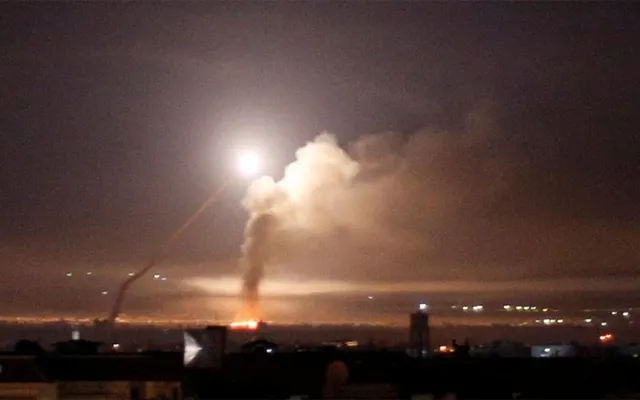
The size of Israeli fire was far higher than in past episodes and Damascus occupants depicted seeing a progression of blasts over the city from air guard frameworks.
Strains amongst Israel and Iran have undermined to overflow in Syria, where the Iranian military and associated Shi'ite local army are supporting Syrian President Bashar al-Assad in his war against rebels looking to remove him.
"Air barriers faced several Israeli rockets and some of them achieved their objective and demolished one of the radar destinations," Syrian state news office SANA announced, refering to a military source. Another rocket hit an ammo distribution center, it said.
Asked whether Israel had assaulted close Damascus or mixed interchanges there, an Israeli military representative stated: "I have no remark on that right now."
Syrian state TV was communicating film of its air barriers terminating at approaching rockets, and playing devoted melodies.
It said Israeli warplanes were terminating the rockets from outside Syria's outskirts and focusing on Baath City in Quneitra territory.
Israel's military representative Lieutenant Colonel Jonathan Conricus said before that Israel had struck back for an assault on its stations in the key Golan Heights level. He didn't intricate.
Israeli media said inhabitants of Metulla, on the Lebanese fringe, had been told to go to reinforced hideouts. There was no official affirmation.
Syria's state news office, SANA, and a war screen, the Syrian Observatory for Human Rights, had revealed mounted guns discharge from Israeli-held region at Baath City, situated close to the fringe. The Observatory said rockets were let go at military places of the Syrian armed force and united powers.
A journalist for SANA said strikes were focusing on Syrian air safeguard units and endeavoring to pulverize radar establishments.
Lebanon's National News Agency, refering to Lebanese Army Command, detailed Israeli planes hovering over A lebanese area right off the bat Thursday before leaving.
MOUNTING TENSIONS
The late-night episode took after a surge in strains amongst Israel and Syria, where Iranian and Lebanese Hezbollah powers have been helping Damascus beat back a 7-year-old resistance.
Israel portrays Iran as its greatest risk and Hezbollah as the greatest danger on its fringes.
Expecting that Iran and Hezbollah are setting up a Lebanese-Syrian front against it, Israel has every so often struck at their powers. Iran pointed the finger at it for an April 9 air strike that murdered seven of its military work force in Syria, and promised exact retribution.
Conricus said that in Thursday's assault, around 20 shots, in all probability rockets, were discharged by the Quds Force, an outer arm of the Iranian Revolutionary Guards Corps, at around 12.10 a.m.
"A couple of those rockets were captured" by Israel's Iron Dome air safeguard framework, Conricus told journalists. "We don't know about any losses. The measure of harm that we as of now evaluate is low."
Approached if Israel countered for the salvo, he stated: "We have struck back yet I have no further insights about this."
Desires of a local erupt were fed by US President Donald Trump's declaration on Tuesday that he was pulling back from the Iranian atomic arrangement. Hours after the fact, Israeli rocket rockets focused on an army installation in Kisweh, an authority in the expert Syrian government provincial collusion said.
The strike slaughtered 15 individuals, including eight Iranians, the Observatory said. Israel has neither affirmed nor denied obligation.